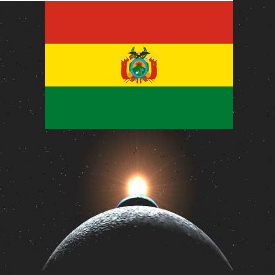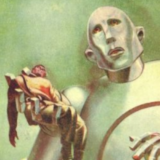Ahhhh, revisionist history. What would we do without it?
The National Post’s Scott Van Wynsberghe wrote a piece on Hugo Gernsback, founder of Amazing Stories. IO9’s Charlie Jane Anders linked to it and offered up a few paragraphs as well.
Over on the Pulpfest website, they’re reprinting Mike Ashley’s history of the magazine in multiple parts.
You ought to be reading Ashley’s HISTORY and pretty much ignoring the rest.
The problem is, with the exception of Ashley, all of the discussion seems to be based on snippets overheard, somewhere. Nearly all of them out of context, most historically inaccurate.
Let’s start with the reality that Amazing Stories’ 90th anniversary actually took place last month. It was sometime in the middle of March of 1926 that issues of the magazine were first distributed to the newsstands. That April cover date was the date AFTER which the magazine should be removed from the racks – not the date at which it should begin its display.
So – Happy Belated 90th Anniversary, Amazing Stories!
Now, here’s the things that have been said about Gernsback: he ruined science fiction, he ripped off authors, he couldn’t write science fiction worth a damn.
Except for that first thing, all true. Don Wollheim once sued him to get himself and a bunch of other authors paid monies long over due. And Ralph 124C41+ is often painful to read – until you realize that it was a fledgling attempt by the author to demonstrate “the kind of story” he wanted for Amazing. The “kind of story” he had identified as uniquely science fictional. The kind of story that mixes an introduction to scientific principals in a compelling and entertaining way.
It took a good couple of years for the pulp era’s authors to figure out how to do that in an effective way. (Heck, there was a time when it was believed that having footnotes interspersed in the text, footnotes that expounded on various scientific principals, was the way to go.)
Those accusations of “ruining the genre”? They’re from Brian Aldiss’ Billion Year Spree* (now re-written as Trillion Year Spree). Aldiss was offering his take on the evolution of the science fiction genre, an evolution that he contends began with the first stories told around the fire, progressed through Gilgamesh, Greek plays, flights of fancy by Cyrano & etc., all the way up to the modern era.
Gernsback had previously been identified by the fan’s historian – Sam Moskowitz – as the “Father of Science Fiction”. If Aldiss’ history was to have any merit, it would be necessary to undermine Moskowitz’s contention (which had become the go-to take within the genre at the time).
It should also be remembered when Aldiss’ revisionist history was being written, he and many other “critics” of the genre were engaged in a battle with academia to try and establish a respectable background for the genre in order to get it accepted as legitimate literature. Pulling in names like Lucien, de Bergerac, Shelley, and constructing a connection between those respected authors/works provided that background.
Suffice to say, there were reasons to try to undermine the true pulp origins of the genre, despite the fact that those connections are tenuous at best. If you really want to read a well-thought out argument that deftly counters each and every one of Aldiss’ (and others who followed his lead such as Suvin and Lundwall), you need to dive into Gary Westfahl’s The Mechanics of Wonder and Hugo Gernsback and the Century of Science Fiction, where Mr. Westfahl makes a strong case supporting Gernsback as THE founder of the genre called Science Fiction.
Non-payment? True. Absolutely. Including a mis-understanding between Gernsback and Wells regarding reprint rights (turns out one was talking dollars and the other pounds). Gernsback lived lavishly, invested heavily in whatever caught his fancy (first home radio set for amateurs to build; one of the first television broadcast stations; one of the first popular magazines devoted to sex…). He also apparently stiffed fans on the cost of a rental hall for one of the first “conventions”.
Steve Silberman, in Neurotribes (a book I nominated for the Best Related Hugo Award this year) advances the supposition that Gernsback was “on the spectrum” and that this may explain a lot of his observed behaviors – including non-payment as not being all that important.
Regardless, this is a separate issue from Gernsback’s positive influence on the genre.
I found it interesting that someone in the comments on IO9 quoted Barry Malzberg (who edited the magazine for a brief period) on Gernsback, but somehow managed to only quote the negative parts. Here’s what Malzberg said in totality:
At the risk of aligning myself with Hugo Gernsback, a venal and small-minded magazine publisher whose reprehensible practices, long since detailed, were contemptible to his contributors, partners, and employees, I think that he did us a great service and that were it not for Gernsback, science fiction as we understand it would not exist. (You can read the whole thing right here.)
the literature did not exist; before he gave it a medium of exclusivity, its dim antecedents were scattered through the range of popular and restricted writing without order, overlap, or sequence. It was the creation of a label and a medium which gave the genre its exclusivity and a place in which it could begin that dialogue, and it was the evolution of magazine science fiction — slowly over the first decade, more rapidly after the ascension of Campbell — that became synonymous with the evolution of the field.
Barry understands that there are two separate issues here – Gernsback’s actions as a business man and Gernsback’s actions as the founder of an entirely new genre.
The National Post’s piece paints a very negative picture by somehow managing to ignore history after Gernsback lost Amazing Stories. What is not revealed is that within months of the bankruptcy decision, Gernsback was publishing not one but TWO new science fiction magazines – Air Wonder Stories and Science Wonder Stories. The two would shortly merge and change their names multiple times, but the history is that the social networking support that Gernsback had established with both Amazing Stories and, earlier, his radio magazines, was continued in Wonder Stories and contributed greatly to the continued sustenance of nascent science fiction fandom.
And finally, despite history re-written in an appeal to academia, despite convention fisticuffs, despite the name-calling and near-celebrated fannish revolution against the founding tyrant, fandom chose to nickname the awards after him. Nearly two decades after he stopped publishing iconic SF magazines (and shortly after his final venture closed).
Gernsback engaged in some questionable business practices. It’s that legacy that has me making absolutely sure that my financial dealings are completely above-board – payments on time or early, no quibbles over pennies, no commitments without follow-through.
But it is also true that without the work he did, we wouldn’t have the genre we know and we wouldn’t have the fandom we know. That is, if you read your history.
*When I first started studying the history of the genre, Aldiss & company’s theory was the popular one and one I embraced as well; in fact I was engaged in my own battles in high school to get SF classes onto the curriculum; I’ve since revised that opinion. It’s a good argument for the idea that elements of science fiction have existed in literature since time began and we can chart a clear evolutionary path through the history of literature, but the genre itself did not exist until the elements that defined that genre had been established. And it is very clear that that job was done, and done well, by none other than Hugo Gernsback.











Recent Comments